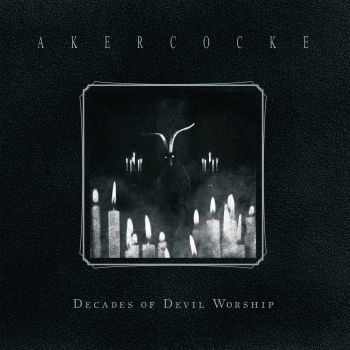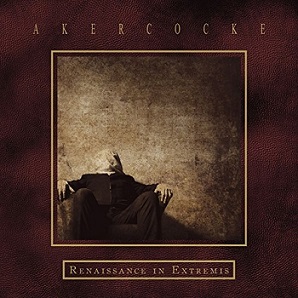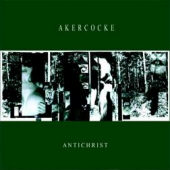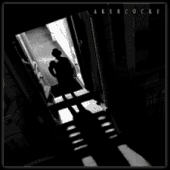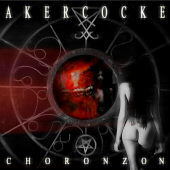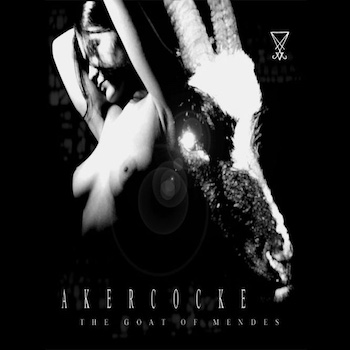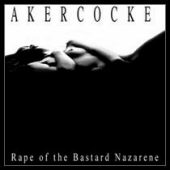Akercocke - Interview
With, firstly, the release of their incendiary debut album "Rape Of The Bastard Nazarene", and then the increasingly confident and progressive albums that followed, before the band went their separate ways after the release of "Antichrist", Akercocke were a shot in the arm for a UK scene which had been home to some of the most seminal bands of the early days of extreme metal, but lost its way a little during the mid-90s, as Scandinavia and the US came to dominate the emergence of black and death metal into the mainstream consciousness. Peter Theobalds was one of the founding members of that band, as well as part of the line-up of Salem Orchid, an underground outfit that were essentially an early incarnation of Akercocke and remained the bass player through the first four sensational albums, before leaving in the wake of the tour supporting "Words That Go Unspoken, Deeds That Go Undone", citing a general disillusionment with the grind of the underground metal lifestyle. Akercocke have since been through a decade-long hiatus, re-emerging with the well-received "Renaissance In Extremis" in 2017, but Theobalds has not been part of the reunion, occupying himself with his own projects these days. With plenty of stories to tell from his time in the band though, MetalBite recently caught up with Theobalds to discuss his reflections on the Akercocke years, disco, funk, Franz Zappa, and his current work as an actor/extra on Star Wars, and Game Of Thrones.
Benjamin
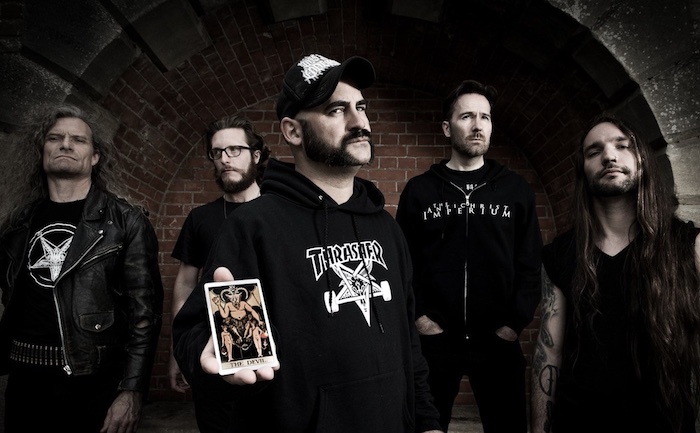
Prior to the release of "Rape Of The Bastard Nazarene", the original line-up had a long history of participation in the London underground metal scene. Was it apparent early on that Akercocke had the potential to reach a more widespread audience than Salem Orchid or other bands with which you had been involved?
If I recall correctly, I'd say that it was pretty much the sole intention of Akercocke to reach a wider audience than previous incarnations. Hence the suits and further leftfield steps we took in the music written at that time. In short Akercocke was a big old "HEY! LOOK AT ME!" exercise in attention grabbing metal music. That's kinda what drew me in really... I wasn't from a metal background as such, instead coming from a more indie / alternative / grunge teenage period to an openly experimental twenties. Myself and David had played together for some years with me on guitar in my odd indie / prog three-piece (Three Days By Camel), and in an almost Pulp kind of psychedelic pop six-piece called Photographing Girls, which was an earlier attempt to get attention by dressing outlandishly: I wore my mother's old 70's blouses and David actually wore a pinafore dress and sang about contentious subjects such as sexual abuse and stalking. I guess Akercocke was a natural progression from all that intention-wise. I took up the bass in Akercocke because I wasn't an accomplished shredder like Paul and Jason were / are.
Akercocke's blend of death metal riffs, black metal atmospherics, and ambient electronics was startlingly different in 1999 from many of your peers. Was this simply a natural result of the band's influences, or did Akercocke set out to create an innovative sound?
That's a bit of both, I think. In relation to the previous question, there was always a desire to sidestep traditional genre defining elements and throw a spanner into the works... so we'd write some grindy kind of death metal passages and then all be like: "right, now we need to switch it up with a break beat or a fucked up vocal drone" etc. We all brought lots of disparate influences from outside of metal anyway. Jason was really into his electronica, David was not-so-closet goth / new romantic, and as mentioned before, I was a big Sonic Youth, Babes In Toyland, Sugar Cubes indie rock / pop kind of obsessive, and we all met in the middle. Both myself and David used to sit and tape obscure and amazing music from the John Peel show, which was a real education every weekend, gifting us influences like Dawson, Blatz, fIREHOSE and Nation Of Ulysses etc...
Which other bands (either at the time or as formative influences) did Akercocke feel a kinship with? Personally, I hear a lot of early Morbid Angel in the riffing style of the first couple of albums – am I a long way off the mark?!
As far as pure riffing, like heavy metal world style, I'd stand up to the end of days and admit to us all being heavily marked by Death, Voivod, Suffocation, Bathory, Autopsy, Napalm Death, Rush, Iron Maiden and yeah, definitely Morbid Angel. You're bang on and I think at times you can hear all of those influences really clearly. We were fans more than musicians primarily, and it was a buzz to make some cool noise like our heroes.
Outside of musical inspirations, Akercocke seemed to take some inspiration from the varied depictions of Satan in both literature and film. Aside from Nye's 'Faust', what other artistic works featured in the creation of the Akercocke aesthetic?
Lyrically, David was drawing from a huge swathe of influences that I couldn't even begin to recall or pretend to understand. Image-wise, as far as my album artwork and the general mood, I myself was compelled by many things; Hammer Horror movies being one, Jamie Reid being another. I initially wanted to have a stark, almost corporate look, with the black and white of the suits reflected in the early publicity flyers and demo covers, which also draw on the 80's vibes of early Adam and The Antz, and the two-tone ska movement. We also wanted to reflect the lyrical content in the imagery, hence a lot of the rather attractive young ladies that featured heavily in the Robert Nye version of Faust from where the band name came... and let's be honest, the ever-present sexism that is implicit in most heavy metal! Sex sells. So, we used it to sell. We weren't as sexy as the girls, haha!
Going back to 'Faust' specifically, it's well-documented that Akercocke took their name from the 'rotten monkey' of that novel. Despite its subject matter, Faust is actually a very funny and irreverent novel. Do you think that at the time, people overlooked the sense of humor and playfulness that was present in your aesthetic?
Yeah, I do actually, and I think that kind of led to the band's demise, for me. We spent half the rehearsal time laughing and playing the fool and all of us have a great deep-seated Monty Python and Young Ones fueled sense of humor but that got lost in the whole "Ooh, we're really bad and satanic" thing which, I feel led to the mood of the band becoming a bit too uptight and serious, and therefore not a very fun place to work.
Akercocke went through a fascinating evolution over the course of the first four albums, with the progressive touches becoming more pronounced during that time. To what degree was that a conscious decision?
Like I touched upon earlier, it was always a consideration to not have too much of one feel for a song... to consciously fuck shit up (technically speaking), and the better our equipment got, and the more we rehearsed and became better musicians, the more it made sense to explore and push the boundaries of what we could achieve on a record and in a live environment.
"Words That Go Unspoken…" was a brave album to release at a time when Akercocke were primarily considered a death metal band and appealed to a well-defined fanbase. Were you aware of this at the time, and was it an intentionally confrontational move to release something so progressive?
I'm not so sure. We certainly weren't trying to impress anyone or make any more of a fuss than usual. I think it was probably, as previously mentioned, more of a result of us flexing new muscles with equipment and playing ability and letting some of our more un-metal influences leak into the recipe book. Self-indulgence to a degree, I guess. Most bands do it at one time or another in their career, haha!
For understandable reasons (simplicity / cost etc.), much modern extreme metal is primarily recorded on computers. However, Akercocke's music suggested a ferociously well-rehearsed band, not least the synchronicity between the guitars and the rhythm section. How important was playing as a group to the development of the band's music?
Oh God! It was HUGELY important! We were incredibly lucky to have a rehearsal space that we didn't have to pay for, and could leave all our equipment set up 24/7, so we could just show up at a given time and power up and get blasting. All thanks to the Gray family, who let us run amok in the back garden where the studio resides, and in their kitchen making round after round of tea. We'd rehearse/jam for at least 14-15 hours a week. Week after week for years, and that's not including recording time, when we'd probably be in the studio doing one thing or another every single day. We were incredibly privileged to have that space at our disposal and it showed in our live performances, I think. We were a very tight band. It was almost an issue of pride to the point that we'd not even touch a beer before playing in the early days, for fear of missing a beat or playing too loose.
Of the records that you played on, do you have a favorite; one record which you feel definitively captures the Akercocke sound?
That's tough to answer now as I haven't listened to any of those records for about 14 years, but I do remember being incredibly proud of Choronzon and Words That Go Unspoken…. Choronzon was a proggy death metal achievement, and Words That Go Unspoken… was a boundary pushing exercise showing that it doesn't all have to be grind and blast.
And looking back, is there anything about the albums that you were part of that you would change?
When I do have the occasion to hear or see something from those years, I do sometimes cringe at how ham it could be at times. Not in a funny, cool kind of way, but in a Bad News/Spinal Tap/taking itself too seriously kind of way. I'd definitely try to maintain a wry sense of humor over the pretentious seriousness if I were to do it all again, but we were young, decision making was often led by egos and testosterone, so I guess it's forgivable at a distance.
I've always felt that you can draw a clear line through the classic British metal bands to Akercocke – Black Sabbath / Venom / Paradise Lost / Bolt Thrower etc. Were you conscious of being part of a particular lineage at the time, and to what extent did being a British band inform your sound?
There was definitely a sense of that in the mix. We all love(d) all those bands which fed directly into the satanic gentleman thing from the Hammer Horror movies, The Mr-Mocata-from-The-Devil-Rides-Out feel, mashed up with the distinctly British sounds of those types of bands. That's the milk and eggs of the Akercocke cake recipe I'd say.
The band garnered a lot of attention right from the beginning for both your striking sartorial image, and Satanic philosophy. Can you comment on what this meant to you personally?
Me personally, I spent my late teenage/early twenties doing what most young folks do: trying to understand who you are and what it all means. I'd been a hashish-piping, mushroom-munching hippy, exploring all facets of different religions other than the Church of England, which we'd been brought up around, and had a deep need to identify with something, or someone to make sense of it all. I was probably ripe for a cult, or some kind of crazy closed shop religion like the Jehovah's Witnesses or something, but somehow at the time Lucifer saved my life. I fell in love with the idea of one of God's perfect creations challenging the established dogma and being banished. The ultimate rebel with his own take on creation. It had a sense of power, empowerment, and it certainly combined well with the aforementioned ego and testosterone to shape me as the bassist of the Akercocke and all the trappings that came with that rank. Having said all that, it was NEVER for me something I was devoted to in a religious sense or exclusively, and it was always an awkward moment meeting fans of the band who were convinced we were somehow connected to Hell, via a hotline or something, when all I wanted was a post-show beer and a chat. In the context of the band, it was always largely an image and a show thing. That is to say, I was never a paid-up, card-carrying member of the Church of Satan, or a practicing, believer of Satanism...it always struck me as almost absurd to be so driven to deny the existence of God, that you actually confirm to yourself that God exists by worshipping his opposite. I've never been religious in any sense unless 'cat worshipper' is a designated religion yet?
Although the lyrical themes of the band tended to focus on depictions of Satanic rites and decadent sex, and the various mythical forms in which Satan could appear; as I understand it, the band's Satanic philosophy was not actually based in a literal belief in the supernatural existence of the devil. Is that correct?
Correct. In the manner of the blues and classic heavy metal it's all about the show first.
All of that said, Akercocke did seem to cultivate the appearance of a 'Hellfire Club'-style group of acquaintances who did actively participate in certain debauched events of a bacchanalian nature. Is this correct, and are there any stories that you can share relating to these times?
No, haha! We had ridiculously drug fueled and boozy house parties where there would sometimes be members of the opposite sex present, and loud music would be played 'til the early hours, but doesn't everyone do that in their twenties? As a rule, we were all pretty shit with women - that's why we formed a band, to try to not be such lonely nerds. It worked quite well to an extent, and that itself comes with a 'be careful what you wish for' caveat, 'cos it's never what you imagined it to be in your dreams and fantasies.
As an artist and graphic designer, you were personally responsible for the band's cover art and visuals during your time in the band. The cover art, in particular, remains highly distinctive and individual. How important was it to you to ensure that the imagery was complementary to the music and philosophy of the band?
Oh, very much indeed! David was (is?) an incredibly talented comic book artist and the jam was usually between the two of us for concepts and visuals. It was down to me finally, as the graphic designer, to put all of our sketches and thoughts into a final professional-looking format. I think also that it was a hug part of our 'success' as a band. Right from the beginning, when we were just playing The Red Eye to a capacity crowd of about 100, I strived to create flyers that weren't your usual unreadable logo, and a gravestone or skull, and Hammy and Lisa told us that our carefully crafted imagery was a huge part in helping them decide to sign us to Peaceville Records. Like a corporate or brand identity it was key to the band from the start. Personally, I loved the original style of black and white high contrast images and band shots. It's partly why I chose the two-tone Rickenbacker - it played to my idea of the time that life is black and white, good and evil, right and wrong, no greys or shades, just duality. I've obviously grown out of that philosophy too, at this stage, haha!
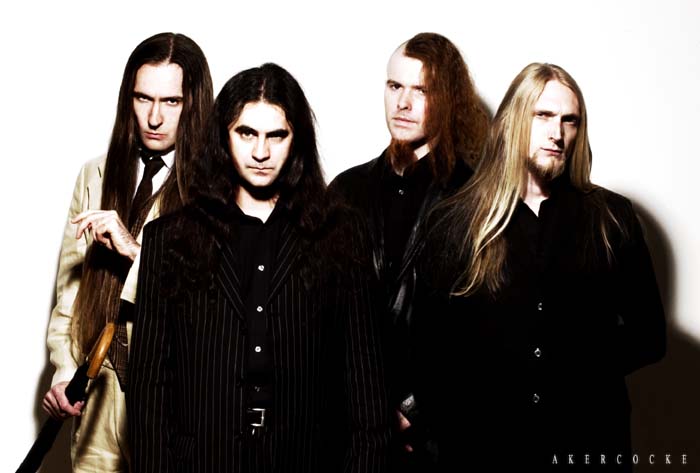
Akercocke's philosophy always seemed some way removed from the more controversial events associated with the black metal scene that took place, primarily in Norway, in the mid-90s. How do you feel now about the importance of these activities to black metal as a cultural movement, if indeed they have any importance at all?
I can only speak from the perspective of somebody who was never really that interested in the black metal side of things. That was more Jason and David's angle. Paul always moaned about the "gay keyboards and shit drumming" and I was always more interested in the big chunks of groovy death metal. I always found the black metal side to be super pretentious or over dramatic to the point of cringe. I'm sure it was valuable to a lot of people, but I couldn't say why.
Were you and the band personally acquainted with any of the key players in the Scandinavian black metal scene, and do you have anything of interest that you can share in relation to this?
No, haha! We were kind of on the heels of that whole scene really, so by the time we came in to contact with any of them at shows or festivals they were 'rock stars', and we were just these twats in suits handing out free demos.
Akercocke were always an intense and domineering live presence. How important was it to the band to build a strong reputation as a live act?
Very, very important. We rehearsed 3 times a week for a rough total of about 12-16 hours, not to mention our own personal home practice routines. One thing I'll always be very proud of was the work ethic. We always wanted to be the tightest sounding, most brutally precise, attacking band on any bill we played and quite often we were.
Did you enjoy the touring lifestyle, and what were the best and worst things about it?
Reckless, younger me totally did, the novelty of new towns every night, the excitement of being paid to travel to amazing locations and play heavy metal to genuinely grateful people for weeks at a time was absolutely incredible, but eventually it was a large part of my decision to step back from music in general… It could be a very toxic environment from perspective of health, and personally I found it exacerbated the selfish, thoughtless side of me. I absolutely don't regret having had the fantastic opportunity to have done it for so long, but I certainly don't miss it, haha! I've got new, exciting challenges in my life now, that are far healthier for me and my family.
When you left the band, you cited the fact that the grind of professional band life meant that you had lost some of the enjoyment of playing with the group. Was this the whole story, and do you feel in retrospect that you made the right decision?
Oh, it was a whole lot more than just that honestly. Friendships had fractured, trust was dissolving, rehearsals weren't fun, creativity was regressing... lots of decisions seemed to be being made without the group consultation that we always used to have in a band way. It started to feel like I was at a day job, which was obviously the last thing I wanted. Don't get me wrong, I was also starting to believe the hype myself, and was becoming a massive arsehole, and hurting people closest to me. So, in retrospect, it was and has been the best decision I've made in my adult life. It was hard at the time, and I thought it would blow over and before long and we'd come back together and make music, but the longer I was away from the band, the surer I was that I'd escaped at the right time for me to avoid a majorly problematic life.
How is your relationship these days with the rest of the original line-up, and have you listened to the records that they have released since your departure?
There is no relationship with any of them. Without going into detail, haven't really looked back since I left in 2007. I'm very much of the philosophy that leaving the past behind is a healthy thing, and I'm not really a nostalgic person in general, so I think the good memories and amazing accomplishments I enjoyed from my time in the band should stay in the museum of joy and not be something I try to re-live in a mid-life crisis kind of messy way, haha!
I can hear a fair amount of Akercocke influence in much contemporary extreme metal, from the dissonant sounds of The Ruins Of Beverast and Schammasch, to the more psychedelic weirdness of Oranssi Pazuzu. Do you keep yourself up to date with the metal scene in 2021, and if so, who do you think is producing interesting and inspiring music?
It'd be incredibly flattering to think my music had influenced anyone in any way, and kind of lovely to have a little dribble of legacy in the current extreme music scene, but I don't really follow it that much these days. I have a couple of younger friends, Chris Locke and Luke Braddick of Terra who sometimes punt music my way, like nephews to their old and out of touch uncle and some of them stick and others I just 'meh' out on. Some bands in the extreme corner I still listen to a lot, mostly on training playlists for motivation, or long drives to keep me from snoozing into the central reservation. Crypta, Gatecreeper, Black Breath and, of course, Napalm Death, who continue to make interesting music in what's really a traditional genre doing things by numbers by this time.
In terms of your own personal musical influences, who have been the most important bands, and what have been the most important albums to you during your life?
I grew up hearing disco and funk, so genuinely that's my forever go-to happy place jam corner. Chic, James Brown, Betty Davis, Roy Ayers hugely influenced my love of all things groove. Growing out from that through my teens and into my twenties came Adam and The Ants, A-Ha, Sonic Youth, Voivod, Gong, The Mahavishnu Orchestra, Rush, Led Zeppelin, Primus, and Frank Zappa, to name a mere thumbnail of the artists that influenced any or all of my playing. Out of those, album-wise the most profoundly important have been Dirk Wears White Sox, Daydream Nation, Nothingface, Gazeuse, 2112, Led Zeppelin II, Frizzle Fry, Bird Of Fire and Overnite Sensation, but, for sure, there are so many more that'd just make this into a big, long, dull playlist recommendation ha! So yeah… go and add all those albums to your playlist and you can thank me later.
As a bass player, which musicians inspired you to pick up the instrument in the first place?
As above... soooooo many but Geddy Lee for sure, Chris Squire, Andy Warren and Blacky. All beautifully concise and meticulous musicians, that still manage to infuse such palpable soul into their playing. In my humble opinion, as a bass player, if you're not grooving with soul at least 50% of the time then you're failing at your job.
It quite often seems that the bass as an instrument in metal can be an afterthought for many bands, and it is frequently rendered inaudible in the mix. Do you agree that bass is underutilized in metal?
Yeah? Probably? I've always leaned heavily towards bands that let the bass shine to be honest… I'd sooner listen to Primus than Metallica, or Voivod than Pantera. All guitars and no bass make a band sound very flat. It's not just about the low end, it's the clank and grind that adds an edge and makes a band sound even more aggressive. It's why I chose the Rickenbacker too, it's an unmistakable sound not just a fat old cushion for the guitars to sit on.
Since you left Akercocke, you've appeared as an actor in Game of Thrones, and a number of blockbuster films, including Star Wars: The Force Awakens, and Guardians Of The Galaxy. How did that come about, and what have been the most memorable experiences during this time?
It came about from my desire to avoid a 9-5, Monday to Friday grind at all costs. It started really as a kind of "yeah I can do that...maybe?", and quickly transformed into a "I REALLY wanna do this more." So, I began to train and study other disciplines to make me more employable as an extra or supporting cast member: archery, sword fighting, firearms training, horse-riding. as well as acting, and I can honestly say it's an obsession for the last 10 years or so. Even doing amazing things like Star Wars, Game Of Thrones and Marvel movies, I want to do more! Become more involved, have more challenges and responsibility. I have so many insane stories that's an interview in itself; from cocaine-fueled directors calling in helicopter cameras over massive fireballs, and charging horses, to chatting amiably with Hollywood A-Listers, who insist on making conversation with lesser cast members, much to the horror of their entourage. Every day on every job has at least one moment where I have to just step back from it and say to myself "WOW...just take this in and be grateful".
One of my favorite recent memories though, as a Star Wars obsessive, was spending weeks on end on a tiny set with Han Solo and Lando Calrissian, and a whole plethora of creatures, and between takes being able to chat to the puppeteers and other actors about what they are doing. It was the ultimate Disneyland experience for mega-nerds, and they paid me to do it!
As far as I'm aware, your involvement in music since Akercocke has been limited. Do you have any aspirations to return to recording and performing in the future?
After I quit Akercocke, I wanted to step back from music, but ended up being drawn back into it by the awesome Bristol band Gonga, I played with them for around 2 years before the commute put a stop to that, and then I drifted into playing with the brilliant End Of Level Boss. We did a few cool shows, most notably playing at the request of Voivod, who curated Roadburn in 2011, but ultimately, I couldn't shake the feeling I wanted to be doing something else. Music is so much fun, and the expressive outlet is second to none, but it's soooooooo much effort for so little reward from where I'm standing, so unless I can find the time to finally record the solo album that's been brewing for 15 years, or End of Level Boss gets an amazing, well organized and well-paid tour, then I'll probably just stick to annoying my girlfriend with riffs and scales.
Finally, outside of your thespian pursuits, what else are you doing to keep yourself busy these days, and is there anything that you would like our readers to be aware of or that they can support?
As mentioned above, there's a lot involved in keeping yourself employable as an actor / performer. If I'm not working, I'll be brushing up on skills, learning new ones or chasing agents. In my free time, I like to tinker with 3D-printing and prop-making and annoying my girlfriend by making too many helmets and guns to clutter up the house with.
Discography
Upcoming Releases
- Morrath - Obscure Abominations - Feb 25
- Chalice - Divine Spear - Feb 27
- Blackwater Drowning - Obscure Sorrows - Feb 27
- Vide - Aux Enfants Des Ruines - Feb 27
- The Leaving - The Leaving - Mar 06
- Serpent Icon - Tombstone Stories - Mar 06
- Insect Inside - Reborn In Blight - Mar 06
- Triumpher - Piercing The Heart Of The World - Mar 06
- Lömsk - Act II - Of Iron And Blood - Mar 06
- God Against Humanity - The Judgement - Mar 06
- Miserere Luminis - Sidera - Mar 06
- Gravemass - This Is The Way - Mar 06
- No/Más - No Peace - Mar 13
- Monstrosity - Screams From Beneath The Surface - Mar 13
- Against I - Anti Life - Mar 13
- Empire Of Disease - While Everything Collapses - Mar 19
- Hanging Garden - Isle Of Bliss - Mar 20
- Putred - Blestemul Din Adânc - Mar 20
- Gaerea - Loss - Mar 20
- Diatribes - Degenerate - Mar 20

